新概念第三册 Lesson 31 A lovable eccentric 讲义
文档属性
| 名称 | 新概念第三册 Lesson 31 A lovable eccentric 讲义 |
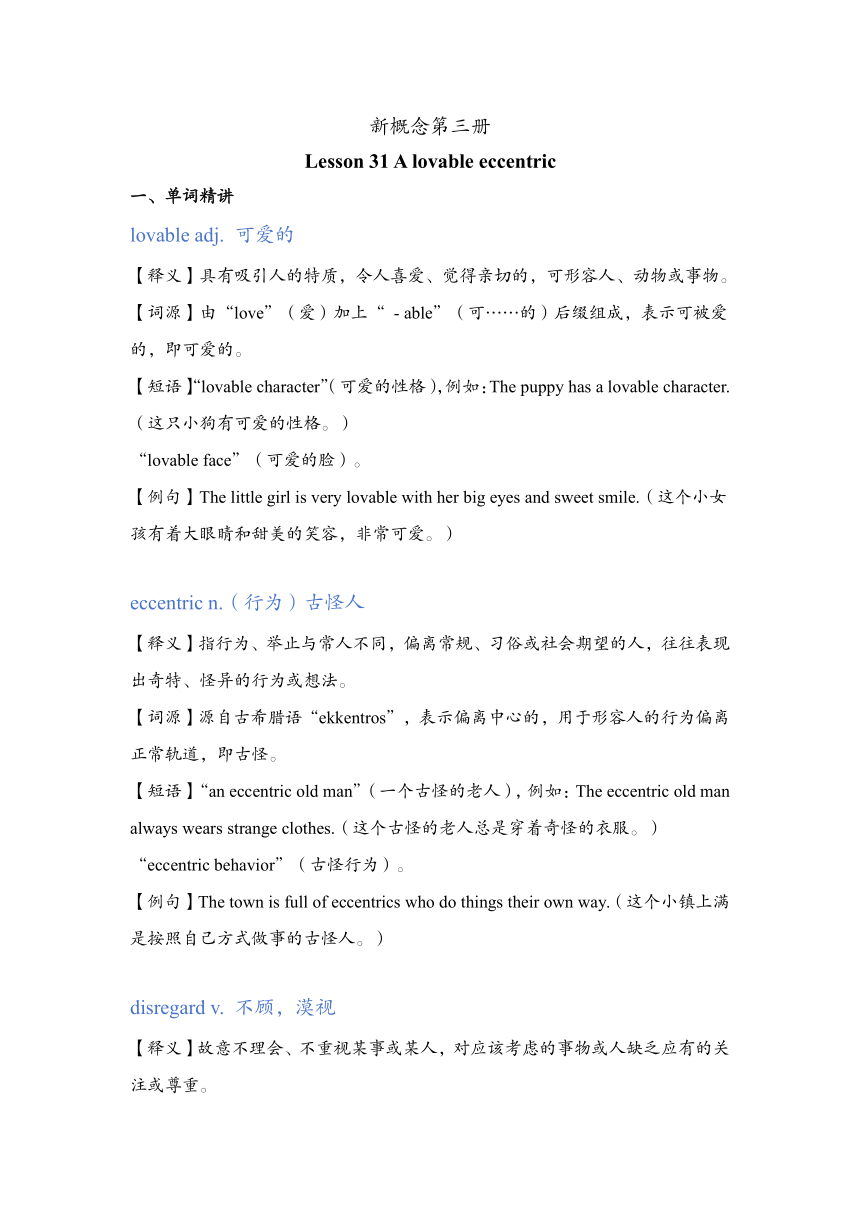
|
|
| 格式 | docx | ||
| 文件大小 | 169.4KB | ||
| 资源类型 | 教案 | ||
| 版本资源 | 新概念英语 | ||
| 科目 | 英语 | ||
| 更新时间 | 2024-12-04 00:00:00 | ||
图片预览

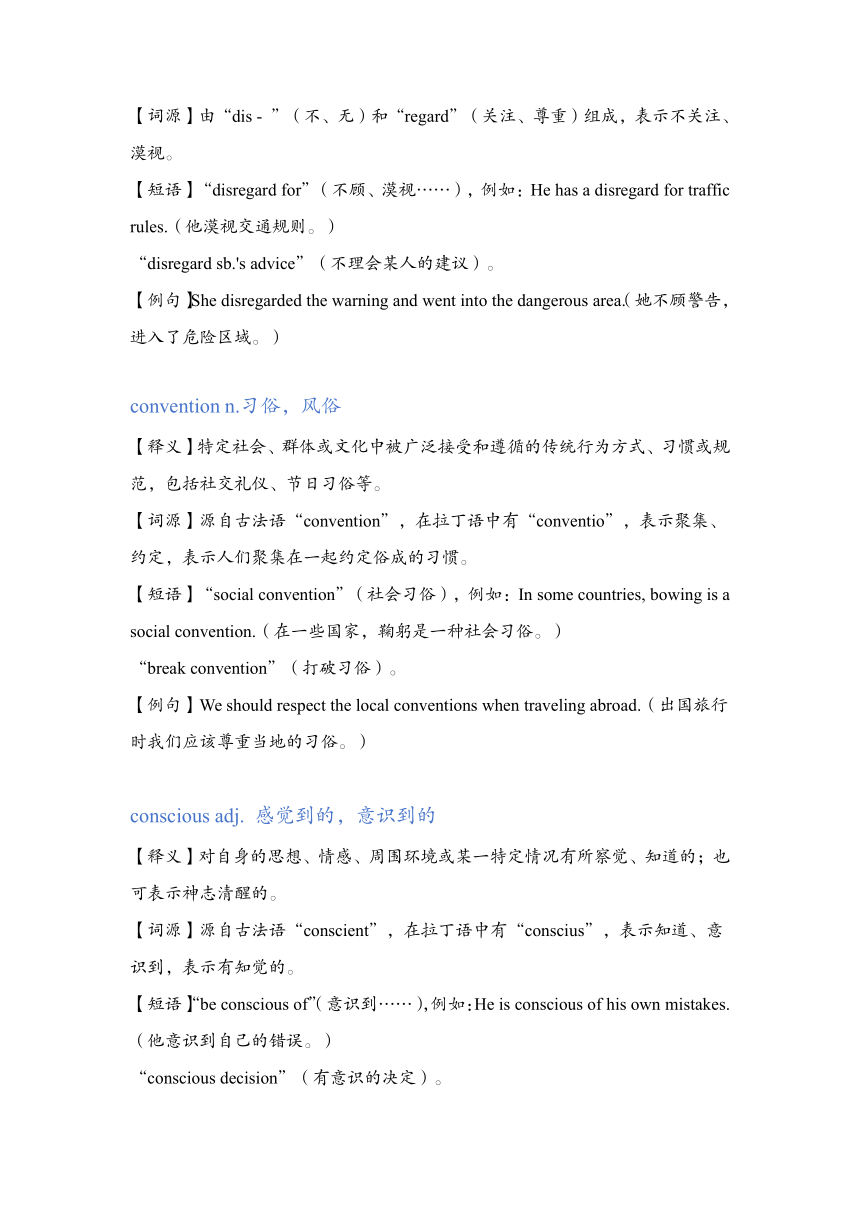
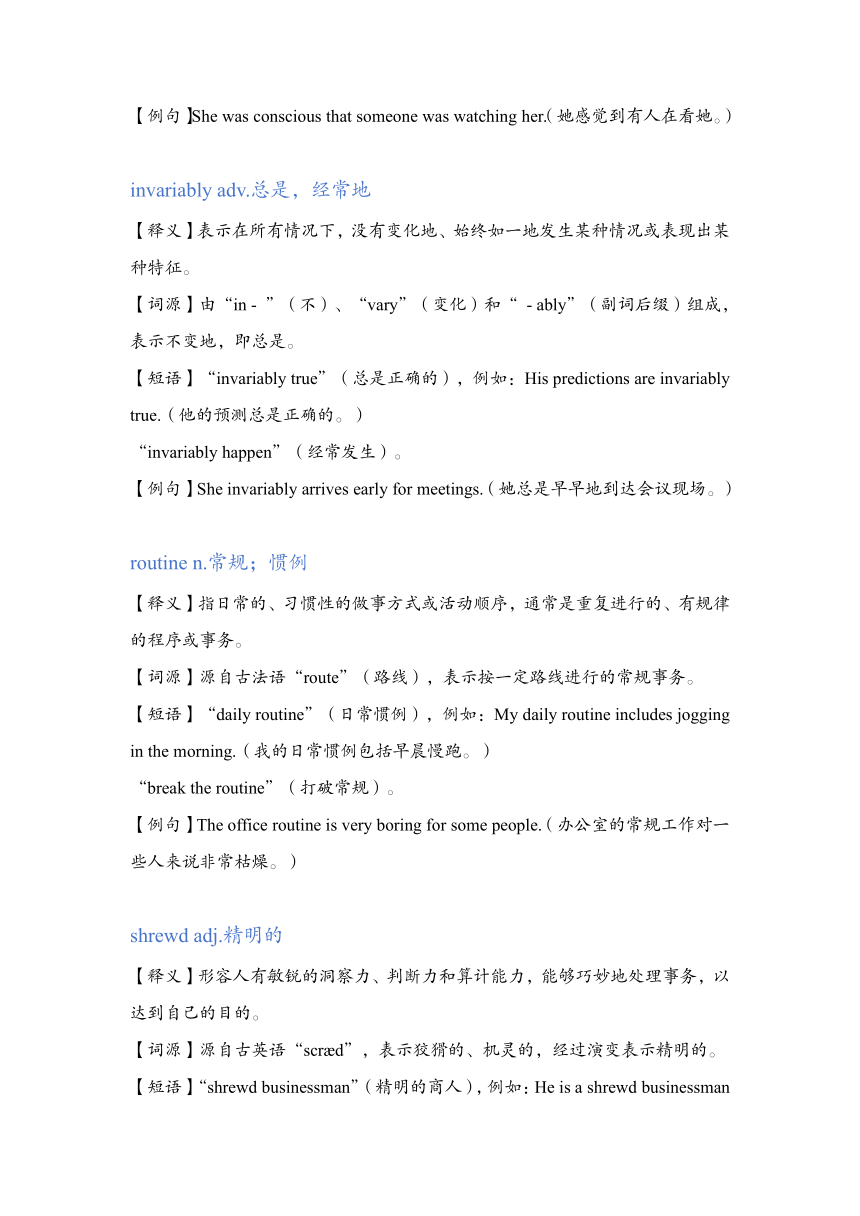
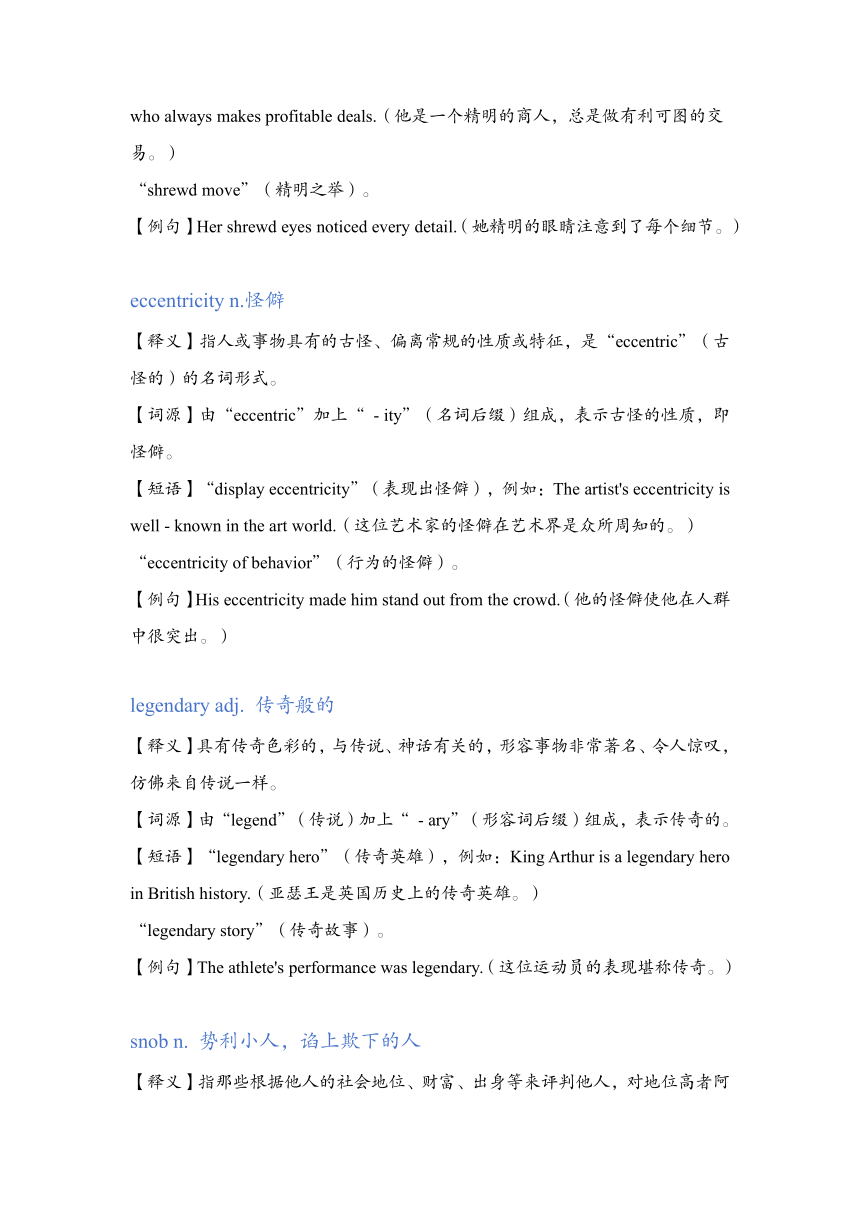
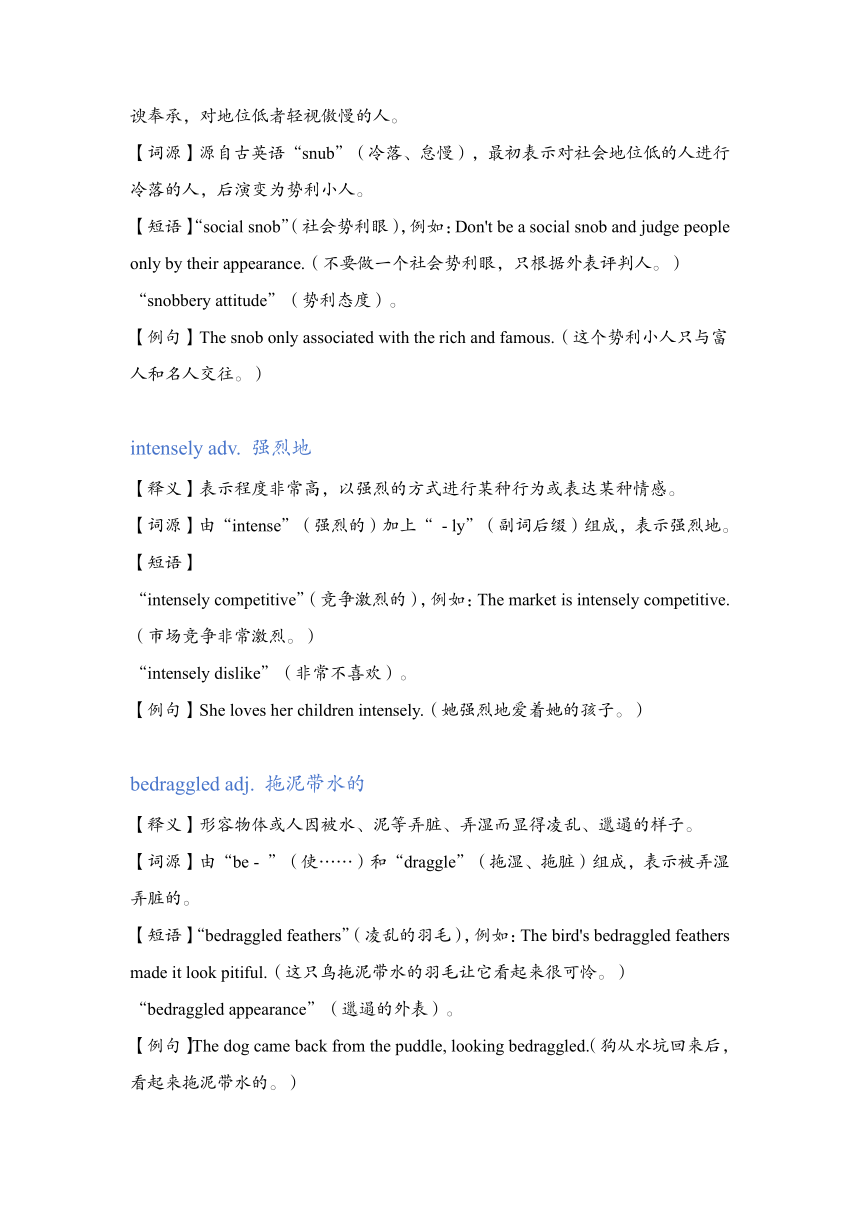
文档简介
新概念第三册
Lesson 31 A lovable eccentric
单词精讲
lovable adj. 可爱的
【释义】具有吸引人的特质,令人喜爱、觉得亲切的,可形容人、动物或事物。
【词源】由“love”(爱)加上“ - able”(可……的)后缀组成,表示可被爱的,即可爱的。
【短语】“lovable character”(可爱的性格),例如:The puppy has a lovable character.(这只小狗有可爱的性格。)
“lovable face”(可爱的脸)。
【例句】The little girl is very lovable with her big eyes and sweet smile.(这个小女孩有着大眼睛和甜美的笑容,非常可爱。)
eccentric n.(行为)古怪人
【释义】指行为、举止与常人不同,偏离常规、习俗或社会期望的人,往往表现出奇特、怪异的行为或想法。
【词源】源自古希腊语“ekkentros”,表示偏离中心的,用于形容人的行为偏离正常轨道,即古怪。
【短语】“an eccentric old man”(一个古怪的老人),例如:The eccentric old man always wears strange clothes.(这个古怪的老人总是穿着奇怪的衣服。)
“eccentric behavior”(古怪行为)。
【例句】The town is full of eccentrics who do things their own way.(这个小镇上满是按照自己方式做事的古怪人。)
disregard v. 不顾,漠视
【释义】故意不理会、不重视某事或某人,对应该考虑的事物或人缺乏应有的关注或尊重。
【词源】由“dis - ”(不、无)和“regard”(关注、尊重)组成,表示不关注、漠视。
【短语】“disregard for”(不顾、漠视……),例如:He has a disregard for traffic rules.(他漠视交通规则。)
“disregard sb.'s advice”(不理会某人的建议)。
【例句】She disregarded the warning and went into the dangerous area.(她不顾警告,进入了危险区域。)
convention n.习俗,风俗
【释义】特定社会、群体或文化中被广泛接受和遵循的传统行为方式、习惯或规范,包括社交礼仪、节日习俗等。
【词源】源自古法语“convention”,在拉丁语中有“conventio”,表示聚集、约定,表示人们聚集在一起约定俗成的习惯。
【短语】“social convention”(社会习俗),例如:In some countries, bowing is a social convention.(在一些国家,鞠躬是一种社会习俗。)
“break convention”(打破习俗)。
【例句】We should respect the local conventions when traveling abroad.(出国旅行时我们应该尊重当地的习俗。)
conscious adj. 感觉到的,意识到的
【释义】对自身的思想、情感、周围环境或某一特定情况有所察觉、知道的;也可表示神志清醒的。
【词源】源自古法语“conscient”,在拉丁语中有“conscius”,表示知道、意识到,表示有知觉的。
【短语】“be conscious of”(意识到……),例如:He is conscious of his own mistakes.(他意识到自己的错误。)
“conscious decision”(有意识的决定)。
【例句】She was conscious that someone was watching her.(她感觉到有人在看她。)
invariably adv.总是,经常地
【释义】表示在所有情况下,没有变化地、始终如一地发生某种情况或表现出某种特征。
【词源】由“in - ”(不)、“vary”(变化)和“ - ably”(副词后缀)组成,表示不变地,即总是。
【短语】“invariably true”(总是正确的),例如:His predictions are invariably true.(他的预测总是正确的。)
“invariably happen”(经常发生)。
【例句】She invariably arrives early for meetings.(她总是早早地到达会议现场。)
routine n.常规;惯例
【释义】指日常的、习惯性的做事方式或活动顺序,通常是重复进行的、有规律的程序或事务。
【词源】源自古法语“route”(路线),表示按一定路线进行的常规事务。
【短语】“daily routine”(日常惯例),例如:My daily routine includes jogging in the morning.(我的日常惯例包括早晨慢跑。)
“break the routine”(打破常规)。
【例句】The office routine is very boring for some people.(办公室的常规工作对一些人来说非常枯燥。)
shrewd adj.精明的
【释义】形容人有敏锐的洞察力、判断力和算计能力,能够巧妙地处理事务,以达到自己的目的。
【词源】源自古英语“scr d”,表示狡猾的、机灵的,经过演变表示精明的。
【短语】“shrewd businessman”(精明的商人),例如:He is a shrewd businessman who always makes profitable deals.(他是一个精明的商人,总是做有利可图的交易。)
“shrewd move”(精明之举)。
【例句】Her shrewd eyes noticed every detail.(她精明的眼睛注意到了每个细节。)
eccentricity n.怪僻
【释义】指人或事物具有的古怪、偏离常规的性质或特征,是“eccentric”(古怪的)的名词形式。
【词源】由“eccentric”加上“ - ity”(名词后缀)组成,表示古怪的性质,即怪僻。
【短语】“display eccentricity”(表现出怪僻),例如:The artist's eccentricity is well - known in the art world.(这位艺术家的怪僻在艺术界是众所周知的。)
“eccentricity of behavior”(行为的怪僻)。
【例句】His eccentricity made him stand out from the crowd.(他的怪僻使他在人群中很突出。)
legendary adj. 传奇般的
【释义】具有传奇色彩的,与传说、神话有关的,形容事物非常著名、令人惊叹,仿佛来自传说一样。
【词源】由“legend”(传说)加上“ - ary”(形容词后缀)组成,表示传奇的。
【短语】“legendary hero”(传奇英雄),例如:King Arthur is a legendary hero in British history.(亚瑟王是英国历史上的传奇英雄。)
“legendary story”(传奇故事)。
【例句】The athlete's performance was legendary.(这位运动员的表现堪称传奇。)
snob n. 势利小人,谄上欺下的人
【释义】指那些根据他人的社会地位、财富、出身等来评判他人,对地位高者阿谀奉承,对地位低者轻视傲慢的人。
【词源】源自古英语“snub”(冷落、怠慢),最初表示对社会地位低的人进行冷落的人,后演变为势利小人。
【短语】“social snob”(社会势利眼),例如:Don't be a social snob and judge people only by their appearance.(不要做一个社会势利眼,只根据外表评判人。)
“snobbery attitude”(势利态度)。
【例句】The snob only associated with the rich and famous.(这个势利小人只与富人和名人交往。)
intensely adv. 强烈地
【释义】表示程度非常高,以强烈的方式进行某种行为或表达某种情感。
【词源】由“intense”(强烈的)加上“ - ly”(副词后缀)组成,表示强烈地。
【短语】
“intensely competitive”(竞争激烈的),例如:The market is intensely competitive.(市场竞争非常激烈。)
“intensely dislike”(非常不喜欢)。
【例句】She loves her children intensely.(她强烈地爱着她的孩子。)
bedraggled adj. 拖泥带水的
【释义】形容物体或人因被水、泥等弄脏、弄湿而显得凌乱、邋遢的样子。
【词源】由“be - ”(使……)和“draggle”(拖湿、拖脏)组成,表示被弄湿弄脏的。
【短语】“bedraggled feathers”(凌乱的羽毛),例如:The bird's bedraggled feathers made it look pitiful.(这只鸟拖泥带水的羽毛让它看起来很可怜。)
“bedraggled appearance”(邋遢的外表)。
【例句】The dog came back from the puddle, looking bedraggled.(狗从水坑回来后,看起来拖泥带水的。)
dump v.把……砰的一声抛下
【释义】突然、用力地放下或抛下某物,通常伴随着较大的声响,也可指倾倒(垃圾等)。
【词源】可能源于拟声词,模拟物体抛下时的声音。
【短语】“dump sth. on the floor”(把某物砰的一声扔在地上),例如:He dumped his bag on the floor and sat down.(他把包砰的一声扔在地上然后坐下了。)
“dump garbage”(倾倒垃圾)。
【例句】She angrily dumped the books on the table.(她生气地把书砰的一声扔在桌子上。)
apologetic adj. 道歉的
【释义】表示有道歉的意思、态度或神情,显示出对自己的错误或不当行为感到懊悔。
【词源】由“apology”(道歉)加上“ - etic”(形容词后缀)组成,表示道歉的。
【短语】“apologetic tone”(道歉的语气),例如:He spoke in an apologetic tone.(他用道歉的语气说话。)
“apologetic look”(道歉的神情)。
【例句】She gave an apologetic smile when she realized her mistake.(当她意识到自己的错误时,她露出了一个道歉的微笑。)
reprimand v. 训斥
【释义】正式地、严厉地批评某人的错误或不当行为,通常是上级对下级或者长辈对晚辈。
【词源】源自古法语“reprimandre”,在拉丁语中有“reprimere”,表示压制、抑制,表示对不当行为的压制性批评。
【短语】“reprimand sb. for sth.”(因某事训斥某人),例如:The teacher reprimanded him for being late.(老师因他迟到而训斥他。)
“receive a reprimand”(受到训斥)。
【例句】His boss reprimanded him severely for his carelessness.(他的老板因他的粗心大意而严厉地训斥他。)
stage v.暗中策划
【释义】精心安排、策划某事(通常是秘密地或有策略地),使某事按照预定的计划发生。
【词源】源自古法语“estage”(舞台),最初表示在舞台上安排表演,后引申为暗中策划事件。
【短语】“stage an event”(策划一个事件),例如:They staged a protest to demand better working conditions.(他们暗中策划了一场抗议活动以要求更好的工作条件。)
“stage a coup”(策划政变)。
【例句】The rebels staged an uprising against the government.(叛乱者暗中策划了一场反对政府的起义。)
elaborate adj.精心构思的
【释义】经过精心设计、制作或思考的,含有丰富的细节、复杂的结构或精细的工艺。
【词源】由“e - ”(出)和“laborate”(劳动、工作)组成,表示付出劳动精心制作的。
【短语】“elaborate plan”(精心构思的计划),例如:They came up with an elaborate plan to solve the problem.(他们想出了一个精心构思的计划来解决问题。)
“elaborate design”(精心的设计)。
【例句】The elaborate wedding ceremony impressed everyone.(精心构思的婚礼仪式给每个人都留下了深刻的印象。)
二、课文精讲
1.True eccentrics never deliberately set out to draw attention to themselves.真正古怪的人从不有意引人注意。 deliberately在本句中充当方式状语。 Set out to do sth.的意思是“打算做某事”。 以下短语都可表示“吸引对…的注意”: draw attention to
capture attention to
attract attention to
hold attention to
catch attention to
attrest attention to
receive attention to
2.They disregard social conventions without being conscious that they are doing anything extraordinary.他们不顾社会习俗,意识不到自己所作所为有什么特殊之处。 that引导宾语从句,说明“没有意识到的”是什么。
This invariably wins them the love and respect of others, for they add colour to the dull routine of everyday life.他们总能赢得别人的喜爱与尊敬,因为他们给平淡单一的日常生活增添了色彩。 for引导原因状语从句,说明他们赢得喜爱和尊敬的原因是什么。
4.Up to the time of his death, Richard Colson was one of the most notable figures in our town.理查德.科尔森生前是我们镇上最有名望的人之一。 up to表示“直到”,后面既可接时间,又可接其他词或短语。
5.He was a shrewd and wealthy businessman, but most people in the town hardly knew anything about this side of his life.他是个精明能干、有钱的商人,但镇上大部分人对他生活中的这一个方面几乎一无所知。 hardly knew anything表示“几乎一无所知”。
6.He was known to us all as Dickie and his eccentricity had become legendary long before he died.大家都管他叫迪基。早在他去世前很久,他的古怪行为就成了传奇故事了。 be known to的意思是“被…熟知”。Before引导时间状语从句,交代事情发生在迪基去世之前。
Dickie disliked snobs intensely.迪基痛恨势利小人。 intensely意为“强烈地”,为程度副词,作状语。
Though he owned a large car, he hardly ever used it, preferring always to go on foot.尽管他有一辆豪华小轿车,但却很少使用,常常喜欢以步代车。 though引导让步状语从句。preferring always to go on foot为现在分词短语,作伴随状语。
Even when it was raining heavily, he refused to carry an umbrella.即使大雨倾盆,他也总是拒绝带伞。 even when引导让步状语从句,强调迪基个性十足。
10. One day, he walked into an expensive shop after having been caught in a particularly heavy shower.一天,他遇上一场瓢泼大雨,淋得透湿。他走进一家高级商店,要为妻子买一块价值300英镑的手表。 after having been caught in是现在分词短语的被动语态形式,作时间状语。 be caught in a heavy shower不可译作“被赶上了瓢泼大雨”,而应理解为“遇到瓢泼大雨”。
He wanted to buy a 300 watch for his wife, but he was in such a bedraggled condition that an assistant refused to serve him.但店员见他浑身泥水的样子,竟不肯接待他。 that引导结果状语从句,such a bedraggled condition指明原因,that从句说明结果是什么。 serve sb.的意思是“为某人服务”,请特别注意,不可想当然地错用成serve for sb.。
Dickie left the shop without a word and returned carrying a large cloth bag.迪基二话没说就走了。一会儿,他带着一个大布袋回到店里。 carrying a large cloth bag为现在分词短语,作伴随状语。
As it was extremely heavy, he dumped it on the counter.布袋很沉,他重重地把布袋扔在柜台上。 as引导原因状语从句,表示因为袋子重,所以把它扔在柜台上。 dump sth.on的意思是“把某物重重地砸在…上”。
The assistant asked him to leave, but Dickie paid no attention to him and requested to see the manager.店员让迪基走开,他置之不理,并要求见经理。 but并列连接两个转折关系的句子。
Recognizing who the customer was, the manager was most apologetic and reprimanded the assistant severely.经理认出了这位顾客,表示了深深的歉意,还严厉地训斥了店员。 recognising为现在分词,引导原因状语; 后面的who引导宾语从句,说明recognising的内容。 reprimand的意思是“训斥”,语气较重,注意它和blame(责备)的程度不同,后者语气较弱,例如:The teacher blamed him for his coming late.(老师责怪他迟到了。)
When Dickie was given the watch, he presented the assistant with the cloth bag.店员为迪基拿出了那块手表,迪基把布口袋递给他。 was given不可译为“被给”,而应翻译为主动语态“为…拿”。
It contained 300 in pennies.口袋里面装着300镑的便士。 contain用于包括“可见实物”,而include用于包括“抽象事物”。 in pennies作方式状语,意思是“以便士的形式”。
He insisted on the assistant's counting the money before he left—30,000 pennies in all!他坚持要店员点清那些硬币后他才离去。这些硬币加在一起共有 30,000枚! 本句的主体结构为insist on doing sth.(坚持做某事)。 Before引导时间状语从句。In all常放在句尾,起强调作用,意思是“全部,总共”。
On another occasion, he invited a number of important critics to see his private collection of modern paintings.还有一次,他邀请一些著名评论家来参观他私人收藏的现代画。 invite sb.to do sth.的意思是“邀请某人做某事”。 注意本句中的see不作“看”来理解,而应因素为“参观,观摩”。
This exhibition received a great deal of attention in the press, for though the pictures were supposed to be the work of famous artists, they had in fact been painted by Dickie.这次展览引起报界广泛注意,因为这些画名义上是名家的作品,事实上是迪基自己画的。 for引导原因状语从句,这个从句里面又含有一个though引导的让步状语从句。In fact是状语,起强调作用。 be supposed to的意思是“被当作”(但实际上不是)。
21. It took him four years to stage this elaboratejoke simply to prove that critics do not always know what they are talking about.他花了4年时间策划这出精心设计的闹剧,只是想证明评论家们有时并不解他们所谈论的事情。 elaborate joke的意思是“精心设计的闹剧”。 相关短语总结: elaborate account 详尽的记述
elaborate description 详尽的描述
Lesson 31 A lovable eccentric
单词精讲
lovable adj. 可爱的
【释义】具有吸引人的特质,令人喜爱、觉得亲切的,可形容人、动物或事物。
【词源】由“love”(爱)加上“ - able”(可……的)后缀组成,表示可被爱的,即可爱的。
【短语】“lovable character”(可爱的性格),例如:The puppy has a lovable character.(这只小狗有可爱的性格。)
“lovable face”(可爱的脸)。
【例句】The little girl is very lovable with her big eyes and sweet smile.(这个小女孩有着大眼睛和甜美的笑容,非常可爱。)
eccentric n.(行为)古怪人
【释义】指行为、举止与常人不同,偏离常规、习俗或社会期望的人,往往表现出奇特、怪异的行为或想法。
【词源】源自古希腊语“ekkentros”,表示偏离中心的,用于形容人的行为偏离正常轨道,即古怪。
【短语】“an eccentric old man”(一个古怪的老人),例如:The eccentric old man always wears strange clothes.(这个古怪的老人总是穿着奇怪的衣服。)
“eccentric behavior”(古怪行为)。
【例句】The town is full of eccentrics who do things their own way.(这个小镇上满是按照自己方式做事的古怪人。)
disregard v. 不顾,漠视
【释义】故意不理会、不重视某事或某人,对应该考虑的事物或人缺乏应有的关注或尊重。
【词源】由“dis - ”(不、无)和“regard”(关注、尊重)组成,表示不关注、漠视。
【短语】“disregard for”(不顾、漠视……),例如:He has a disregard for traffic rules.(他漠视交通规则。)
“disregard sb.'s advice”(不理会某人的建议)。
【例句】She disregarded the warning and went into the dangerous area.(她不顾警告,进入了危险区域。)
convention n.习俗,风俗
【释义】特定社会、群体或文化中被广泛接受和遵循的传统行为方式、习惯或规范,包括社交礼仪、节日习俗等。
【词源】源自古法语“convention”,在拉丁语中有“conventio”,表示聚集、约定,表示人们聚集在一起约定俗成的习惯。
【短语】“social convention”(社会习俗),例如:In some countries, bowing is a social convention.(在一些国家,鞠躬是一种社会习俗。)
“break convention”(打破习俗)。
【例句】We should respect the local conventions when traveling abroad.(出国旅行时我们应该尊重当地的习俗。)
conscious adj. 感觉到的,意识到的
【释义】对自身的思想、情感、周围环境或某一特定情况有所察觉、知道的;也可表示神志清醒的。
【词源】源自古法语“conscient”,在拉丁语中有“conscius”,表示知道、意识到,表示有知觉的。
【短语】“be conscious of”(意识到……),例如:He is conscious of his own mistakes.(他意识到自己的错误。)
“conscious decision”(有意识的决定)。
【例句】She was conscious that someone was watching her.(她感觉到有人在看她。)
invariably adv.总是,经常地
【释义】表示在所有情况下,没有变化地、始终如一地发生某种情况或表现出某种特征。
【词源】由“in - ”(不)、“vary”(变化)和“ - ably”(副词后缀)组成,表示不变地,即总是。
【短语】“invariably true”(总是正确的),例如:His predictions are invariably true.(他的预测总是正确的。)
“invariably happen”(经常发生)。
【例句】She invariably arrives early for meetings.(她总是早早地到达会议现场。)
routine n.常规;惯例
【释义】指日常的、习惯性的做事方式或活动顺序,通常是重复进行的、有规律的程序或事务。
【词源】源自古法语“route”(路线),表示按一定路线进行的常规事务。
【短语】“daily routine”(日常惯例),例如:My daily routine includes jogging in the morning.(我的日常惯例包括早晨慢跑。)
“break the routine”(打破常规)。
【例句】The office routine is very boring for some people.(办公室的常规工作对一些人来说非常枯燥。)
shrewd adj.精明的
【释义】形容人有敏锐的洞察力、判断力和算计能力,能够巧妙地处理事务,以达到自己的目的。
【词源】源自古英语“scr d”,表示狡猾的、机灵的,经过演变表示精明的。
【短语】“shrewd businessman”(精明的商人),例如:He is a shrewd businessman who always makes profitable deals.(他是一个精明的商人,总是做有利可图的交易。)
“shrewd move”(精明之举)。
【例句】Her shrewd eyes noticed every detail.(她精明的眼睛注意到了每个细节。)
eccentricity n.怪僻
【释义】指人或事物具有的古怪、偏离常规的性质或特征,是“eccentric”(古怪的)的名词形式。
【词源】由“eccentric”加上“ - ity”(名词后缀)组成,表示古怪的性质,即怪僻。
【短语】“display eccentricity”(表现出怪僻),例如:The artist's eccentricity is well - known in the art world.(这位艺术家的怪僻在艺术界是众所周知的。)
“eccentricity of behavior”(行为的怪僻)。
【例句】His eccentricity made him stand out from the crowd.(他的怪僻使他在人群中很突出。)
legendary adj. 传奇般的
【释义】具有传奇色彩的,与传说、神话有关的,形容事物非常著名、令人惊叹,仿佛来自传说一样。
【词源】由“legend”(传说)加上“ - ary”(形容词后缀)组成,表示传奇的。
【短语】“legendary hero”(传奇英雄),例如:King Arthur is a legendary hero in British history.(亚瑟王是英国历史上的传奇英雄。)
“legendary story”(传奇故事)。
【例句】The athlete's performance was legendary.(这位运动员的表现堪称传奇。)
snob n. 势利小人,谄上欺下的人
【释义】指那些根据他人的社会地位、财富、出身等来评判他人,对地位高者阿谀奉承,对地位低者轻视傲慢的人。
【词源】源自古英语“snub”(冷落、怠慢),最初表示对社会地位低的人进行冷落的人,后演变为势利小人。
【短语】“social snob”(社会势利眼),例如:Don't be a social snob and judge people only by their appearance.(不要做一个社会势利眼,只根据外表评判人。)
“snobbery attitude”(势利态度)。
【例句】The snob only associated with the rich and famous.(这个势利小人只与富人和名人交往。)
intensely adv. 强烈地
【释义】表示程度非常高,以强烈的方式进行某种行为或表达某种情感。
【词源】由“intense”(强烈的)加上“ - ly”(副词后缀)组成,表示强烈地。
【短语】
“intensely competitive”(竞争激烈的),例如:The market is intensely competitive.(市场竞争非常激烈。)
“intensely dislike”(非常不喜欢)。
【例句】She loves her children intensely.(她强烈地爱着她的孩子。)
bedraggled adj. 拖泥带水的
【释义】形容物体或人因被水、泥等弄脏、弄湿而显得凌乱、邋遢的样子。
【词源】由“be - ”(使……)和“draggle”(拖湿、拖脏)组成,表示被弄湿弄脏的。
【短语】“bedraggled feathers”(凌乱的羽毛),例如:The bird's bedraggled feathers made it look pitiful.(这只鸟拖泥带水的羽毛让它看起来很可怜。)
“bedraggled appearance”(邋遢的外表)。
【例句】The dog came back from the puddle, looking bedraggled.(狗从水坑回来后,看起来拖泥带水的。)
dump v.把……砰的一声抛下
【释义】突然、用力地放下或抛下某物,通常伴随着较大的声响,也可指倾倒(垃圾等)。
【词源】可能源于拟声词,模拟物体抛下时的声音。
【短语】“dump sth. on the floor”(把某物砰的一声扔在地上),例如:He dumped his bag on the floor and sat down.(他把包砰的一声扔在地上然后坐下了。)
“dump garbage”(倾倒垃圾)。
【例句】She angrily dumped the books on the table.(她生气地把书砰的一声扔在桌子上。)
apologetic adj. 道歉的
【释义】表示有道歉的意思、态度或神情,显示出对自己的错误或不当行为感到懊悔。
【词源】由“apology”(道歉)加上“ - etic”(形容词后缀)组成,表示道歉的。
【短语】“apologetic tone”(道歉的语气),例如:He spoke in an apologetic tone.(他用道歉的语气说话。)
“apologetic look”(道歉的神情)。
【例句】She gave an apologetic smile when she realized her mistake.(当她意识到自己的错误时,她露出了一个道歉的微笑。)
reprimand v. 训斥
【释义】正式地、严厉地批评某人的错误或不当行为,通常是上级对下级或者长辈对晚辈。
【词源】源自古法语“reprimandre”,在拉丁语中有“reprimere”,表示压制、抑制,表示对不当行为的压制性批评。
【短语】“reprimand sb. for sth.”(因某事训斥某人),例如:The teacher reprimanded him for being late.(老师因他迟到而训斥他。)
“receive a reprimand”(受到训斥)。
【例句】His boss reprimanded him severely for his carelessness.(他的老板因他的粗心大意而严厉地训斥他。)
stage v.暗中策划
【释义】精心安排、策划某事(通常是秘密地或有策略地),使某事按照预定的计划发生。
【词源】源自古法语“estage”(舞台),最初表示在舞台上安排表演,后引申为暗中策划事件。
【短语】“stage an event”(策划一个事件),例如:They staged a protest to demand better working conditions.(他们暗中策划了一场抗议活动以要求更好的工作条件。)
“stage a coup”(策划政变)。
【例句】The rebels staged an uprising against the government.(叛乱者暗中策划了一场反对政府的起义。)
elaborate adj.精心构思的
【释义】经过精心设计、制作或思考的,含有丰富的细节、复杂的结构或精细的工艺。
【词源】由“e - ”(出)和“laborate”(劳动、工作)组成,表示付出劳动精心制作的。
【短语】“elaborate plan”(精心构思的计划),例如:They came up with an elaborate plan to solve the problem.(他们想出了一个精心构思的计划来解决问题。)
“elaborate design”(精心的设计)。
【例句】The elaborate wedding ceremony impressed everyone.(精心构思的婚礼仪式给每个人都留下了深刻的印象。)
二、课文精讲
1.True eccentrics never deliberately set out to draw attention to themselves.真正古怪的人从不有意引人注意。 deliberately在本句中充当方式状语。 Set out to do sth.的意思是“打算做某事”。 以下短语都可表示“吸引对…的注意”: draw attention to
capture attention to
attract attention to
hold attention to
catch attention to
attrest attention to
receive attention to
2.They disregard social conventions without being conscious that they are doing anything extraordinary.他们不顾社会习俗,意识不到自己所作所为有什么特殊之处。 that引导宾语从句,说明“没有意识到的”是什么。
This invariably wins them the love and respect of others, for they add colour to the dull routine of everyday life.他们总能赢得别人的喜爱与尊敬,因为他们给平淡单一的日常生活增添了色彩。 for引导原因状语从句,说明他们赢得喜爱和尊敬的原因是什么。
4.Up to the time of his death, Richard Colson was one of the most notable figures in our town.理查德.科尔森生前是我们镇上最有名望的人之一。 up to表示“直到”,后面既可接时间,又可接其他词或短语。
5.He was a shrewd and wealthy businessman, but most people in the town hardly knew anything about this side of his life.他是个精明能干、有钱的商人,但镇上大部分人对他生活中的这一个方面几乎一无所知。 hardly knew anything表示“几乎一无所知”。
6.He was known to us all as Dickie and his eccentricity had become legendary long before he died.大家都管他叫迪基。早在他去世前很久,他的古怪行为就成了传奇故事了。 be known to的意思是“被…熟知”。Before引导时间状语从句,交代事情发生在迪基去世之前。
Dickie disliked snobs intensely.迪基痛恨势利小人。 intensely意为“强烈地”,为程度副词,作状语。
Though he owned a large car, he hardly ever used it, preferring always to go on foot.尽管他有一辆豪华小轿车,但却很少使用,常常喜欢以步代车。 though引导让步状语从句。preferring always to go on foot为现在分词短语,作伴随状语。
Even when it was raining heavily, he refused to carry an umbrella.即使大雨倾盆,他也总是拒绝带伞。 even when引导让步状语从句,强调迪基个性十足。
10. One day, he walked into an expensive shop after having been caught in a particularly heavy shower.一天,他遇上一场瓢泼大雨,淋得透湿。他走进一家高级商店,要为妻子买一块价值300英镑的手表。 after having been caught in是现在分词短语的被动语态形式,作时间状语。 be caught in a heavy shower不可译作“被赶上了瓢泼大雨”,而应理解为“遇到瓢泼大雨”。
He wanted to buy a 300 watch for his wife, but he was in such a bedraggled condition that an assistant refused to serve him.但店员见他浑身泥水的样子,竟不肯接待他。 that引导结果状语从句,such a bedraggled condition指明原因,that从句说明结果是什么。 serve sb.的意思是“为某人服务”,请特别注意,不可想当然地错用成serve for sb.。
Dickie left the shop without a word and returned carrying a large cloth bag.迪基二话没说就走了。一会儿,他带着一个大布袋回到店里。 carrying a large cloth bag为现在分词短语,作伴随状语。
As it was extremely heavy, he dumped it on the counter.布袋很沉,他重重地把布袋扔在柜台上。 as引导原因状语从句,表示因为袋子重,所以把它扔在柜台上。 dump sth.on的意思是“把某物重重地砸在…上”。
The assistant asked him to leave, but Dickie paid no attention to him and requested to see the manager.店员让迪基走开,他置之不理,并要求见经理。 but并列连接两个转折关系的句子。
Recognizing who the customer was, the manager was most apologetic and reprimanded the assistant severely.经理认出了这位顾客,表示了深深的歉意,还严厉地训斥了店员。 recognising为现在分词,引导原因状语; 后面的who引导宾语从句,说明recognising的内容。 reprimand的意思是“训斥”,语气较重,注意它和blame(责备)的程度不同,后者语气较弱,例如:The teacher blamed him for his coming late.(老师责怪他迟到了。)
When Dickie was given the watch, he presented the assistant with the cloth bag.店员为迪基拿出了那块手表,迪基把布口袋递给他。 was given不可译为“被给”,而应翻译为主动语态“为…拿”。
It contained 300 in pennies.口袋里面装着300镑的便士。 contain用于包括“可见实物”,而include用于包括“抽象事物”。 in pennies作方式状语,意思是“以便士的形式”。
He insisted on the assistant's counting the money before he left—30,000 pennies in all!他坚持要店员点清那些硬币后他才离去。这些硬币加在一起共有 30,000枚! 本句的主体结构为insist on doing sth.(坚持做某事)。 Before引导时间状语从句。In all常放在句尾,起强调作用,意思是“全部,总共”。
On another occasion, he invited a number of important critics to see his private collection of modern paintings.还有一次,他邀请一些著名评论家来参观他私人收藏的现代画。 invite sb.to do sth.的意思是“邀请某人做某事”。 注意本句中的see不作“看”来理解,而应因素为“参观,观摩”。
This exhibition received a great deal of attention in the press, for though the pictures were supposed to be the work of famous artists, they had in fact been painted by Dickie.这次展览引起报界广泛注意,因为这些画名义上是名家的作品,事实上是迪基自己画的。 for引导原因状语从句,这个从句里面又含有一个though引导的让步状语从句。In fact是状语,起强调作用。 be supposed to的意思是“被当作”(但实际上不是)。
21. It took him four years to stage this elaboratejoke simply to prove that critics do not always know what they are talking about.他花了4年时间策划这出精心设计的闹剧,只是想证明评论家们有时并不解他们所谈论的事情。 elaborate joke的意思是“精心设计的闹剧”。 相关短语总结: elaborate account 详尽的记述
elaborate description 详尽的描述
同课章节目录
